译林版英语九年级下册教学教案Unit 4 Task
- 格式:doc
- 大小:35.50 KB
- 文档页数:3
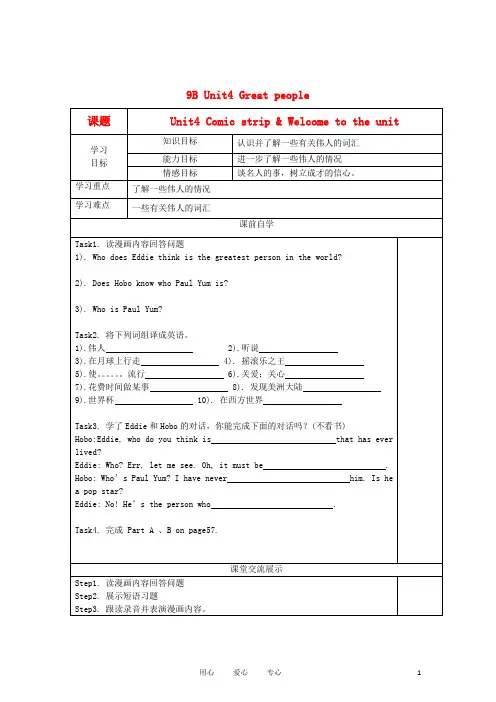
9B Unit4 Great people9B Unit4 Great people参考答案Comic strip & Welcome to the unit一、根据提示,写出正确的单词。
1. astronaut2. stars3. singers.4. invent5. caring for二、用所给词组的正确形式填空。
1.great people2. made popular3. the World Cup4. discovered America5. to care for6. Walking on the moon7. heard of8. in the west Reading(1)一、flight, lisence, joined, pilot, selected, managed, commanded, giant, mankind,heroes, back, alien, Award, citizen二、用所给词的适当形式填空。
1.to walk2.interested skiing3.to become4.better to be safe5.successfully6.flying flight7.engineering8.spinned9.pilots 10.was chosenReading(2)一、用所给词组正确形式填空。
1.stay awy2.Have taken back3.Sending messages to4.tries to5.It is said6.collecting samples7.received an award8.futher study二、同义句转换1.He went to New York at seven2.In his spare time, he built many model planes.3.It is said that Neil was the first man to walk on the moon.4.Our leader gives an important job to me三、翻译句子。
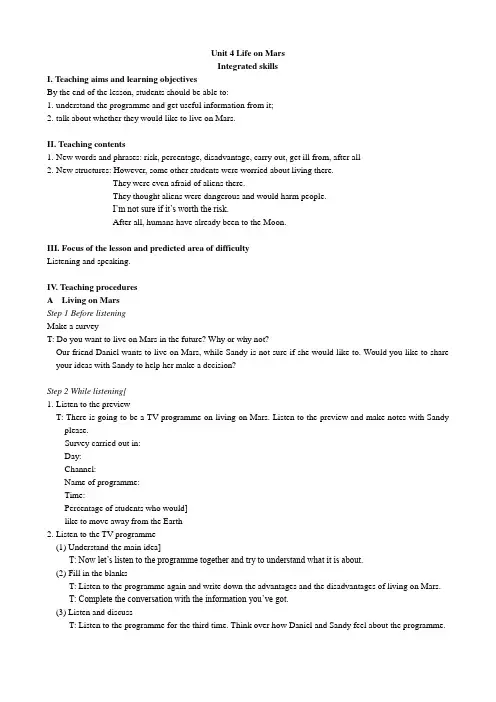
Unit 4 Life on MarsIntegrated skillsI. Teaching aims and learning objectivesBy the end of the lesson, students should be able to:1.understand the programme and get useful information from it;2.talk about whether they would like to live on Mars.II. Teaching contents1.New words and phrases: risk, percentage, disadvantage, carry out, get ill from, after all2.New structures: However, some other students were worried about living there.They were even afraid of aliens there.They thought aliens were dangerous and would harm people.I’m not sure if it’s worth the risk.After all, humans have already been to the Moon.III. Focus of the lesson and predicted area of difficultyListening and speaking.IV. Teaching proceduresA Living on MarsStep 1 Before listeningMake a surveyT: Do you want to live on Mars in the future? Why or why not?Our friend Daniel wants to live on Mars, while Sandy is not sure if she would like to. Would you like to share your ideas with Sandy to help her make a decision?Step 2 While listening[1.Listen to the previewT: There is going to be a TV programme on living on Mars. Listen to the preview and make notes with Sandy please.Survey carried out in: _____________________Day: _____________________Channel: _____________________Name of programme: _____________________Time: _____________________Percentage of students who would]like to move away from the Earth ________2. Listen to the TV programme(1) Understand the main idea]T: Now let’s listen to the programme together and try to understand what it is about.(2) Fill in the blanksT: Listen to the programme again and write down the advantages and the disadvantages of living on Mars.T: Complete the conversation with the information you’ve got.(3) Listen and discussT: Listen to the programme for the third time. Think over how Daniel and Sandy feel about the programme.B Speak up: Earth or Mars?Step 1 After listeningShare your ideasT: After watching the TV programme, how do you feel about living on Mars? Would you like to go there? S: I’d love to live on Mars, because …I’m not sure if it’s worth the risk …Step 2 Practice1.Listen and answerT: Listen to the dialogue between Daniel and Sandy, and answer the following questions.(1) Who would like to live on Mars, Simon or Daniel?(2) Would Sandy like to live on Mars? Why or why not?2.Make a similar dialogueV. Homework1. Recite Part B.2. Talk more about living on Mars after class.。
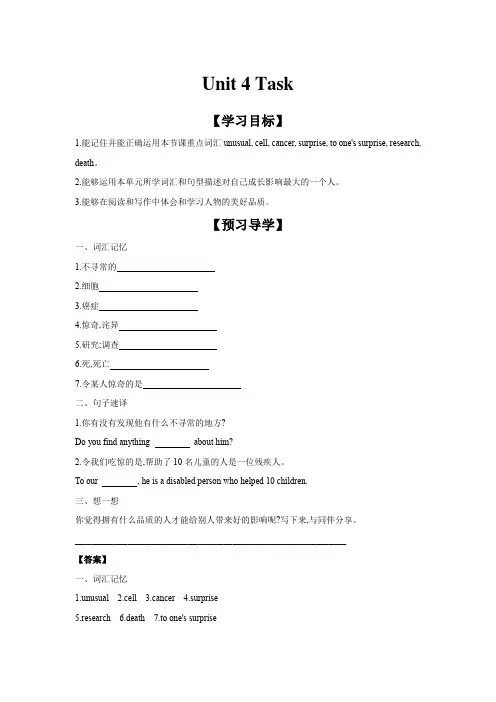
Unit 4 Task【学习目标】1.能记住并能正确运用本节课重点词汇unusual, cell, cancer, surprise, to one's surprise, research, death。
2.能够运用本单元所学词汇和句型描述对自己成长影响最大的一个人。
3.能够在阅读和写作中体会和学习人物的美好品质。
【预习导学】一、词汇记忆1.不寻常的2.细胞3.癌症4.惊奇,诧异5.研究;调查6.死,死亡7.令某人惊奇的是二、句子速译1.你有没有发现他有什么不寻常的地方?Do you find anything about him?2.令我们吃惊的是,帮助了10名儿童的人是一位残疾人。
To our , he is a disabled person who helped 10 children.三、想一想你觉得拥有什么品质的人才能给别人带来好的影响呢?写下来,与同伴分享。
______________________________________________________________【答案】一、词汇记忆1.unusual2.cell3.cancer4.surprise5.research6.death7.to one's surprise二、句子速译1.unusual2.surprise三、想一想never give up, work hard, honest, active, think about others...【合作探究】任务驱动一阅读练习1.阅读教材Task中A部分文章,回答下列问题。
(1)Who has influenced the writer most?______________________________________________________________(2)How old is the writer's father?______________________________________________________________(3)What has her father done since 1990?______________________________________________________________(4)What does the writer think of his father?______________________________________________________________2.用括号内所给词的适当形式填空。
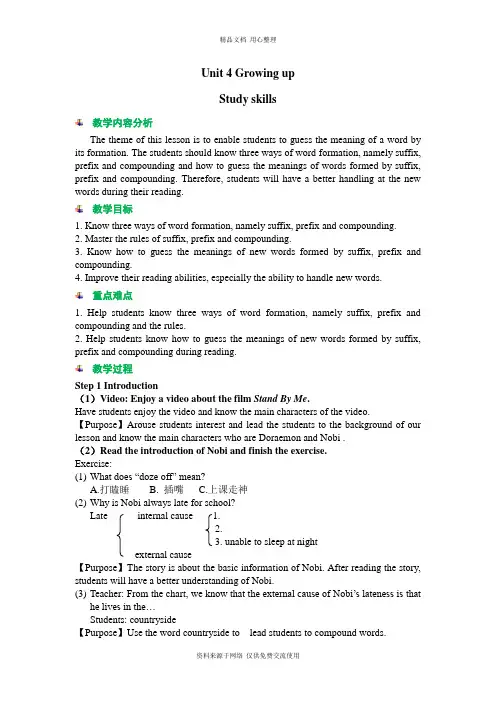
Unit 4 Growing upStudy skills教学内容分析The theme of this lesson is to enable students to guess the meaning of a word by its formation. The students should know three ways of word formation, namely suffix, prefix and compounding and how to guess the meanings of words formed by suffix, prefix and compounding. Therefore, students will have a better handling at the new words during their reading.教学目标1. Know three ways of word formation, namely suffix, prefix and compounding.2. Master the rules of suffix, prefix and compounding.3. Know how to guess the meanings of new words formed by suffix, prefix and compounding.4. Improve their reading abilities, especially the ability to handle new words.重点难点1. Help students know three ways of word formation, namely suffix, prefix and compounding and the rules.2. Help students know how to guess the meanings of new words formed by suffix, prefix and compounding during reading.教学过程Step 1 Introduction(1)Video: Enjoy a video about the film Stand By Me.Have students enjoy the video and know the main characters of the video. 【Purpose】Arouse students interest and lead the students to the background of our lesson and know the main characters who are Doraemon and Nobi .(2)Read the introduction of Nobi and finish the exercise.Exercise:(1)What does “doze off” mean?A.打瞌睡B. 插嘴C.上课走神(2)Why is Nobi always late for school?Late internal cause 1.2.3. unable to sleep at nightexternal cause【Purpose】The story is about the basic information of Nobi. After reading the story, students will have a better understanding of Nobi.(3)Teacher: From the chart, we know that the external cause of Nobi’s lateness is thathe lives in the…Students: countryside【Purpose】Use the word countryside to lead students to compound words.Step 2 Compounding1. Have students think about the rules of compound words and also how to guess the meanings of compound words.【Purpose】Students will know the rules of compound words and how to guess the meanings.2. Guess the meanings of some compound words and fill the words into the story. 【Purpose】This step is designed to check whether students have master the rules of compounding. Students are required to guess the meanings of these compound words first and then practise their reading skills.3. Question: From Nobi’s grandson, what do we know about Nobi’s future l ife? Answer: He will have an unlucky life.【Purpose】Use the word unlucky to lead students to prefix.Step 3 Prefix1. Have students think about the rules of prefix and also how to guess the meanings of words formed by prefix.【Purpose】Students will know the rules of prefix and how to guess the meanings.2. Let students think about more prefixes and give students a table as supplement.3. Finish Nobi’s We-chat with Linda.【Purpose】This step is designed to check whether students have master the rules of prefix. Students are required to finish the We-chat conversation by using prefix.4. Question: How does Nobi think that Doraemon is willing to help him to change for the better?Answer: It is such luckiness that he is willing to help me to change for the better. 【Purpose】Use the word luckiness to lead students to prefix.Step 4 Suffix1. Have students think about the rules of suffix and also how to guess the meanings of words formed by suffix.【Purpose】Students will know the rules of suffix and how to guess the meanings.2. Let students think about more suffixes and give students a table as supplement.3. Read Doraemon’s impression of Nobi and match the meanings with the words in pairs.【Purpose】This step is designed to check whether students have master the rules of suffixes.Step 4 Consolidation1. Have students think about the three ways of word formation and the respective rules.【Purpose】Students will have a short review of word formation.2. Finish Exercise 1 guess the Chinese meanings of these words by word formation.【Purpose】Students will use the rules to guess the meanings.3. Finish Exercise 2 match the words with its meanings and Exercise 3 multiple choice questions.【Purpose】Skimming skill is widely used in reading. After skimming, students will get the main idea of the passage. This step is designed to enable students use the skills of skimming and guessing the meanings of new words by word formation together to have a basic understanding of the passage.4. Finish Exercise 4 translate the two sentences into Chinese and Exercise 5 answer two questions.【Purpose】Students will use scanning skills to have a detailed understanding of the passage. What’s more, the guessing skills will be required to guess the meanings of words to sentences.家庭作业Read an article from Nobi’s best-seller Better to Give or Receive, and then finish the exercises.【Purpose】Practise students reading skills of guessing the meanings of words by word formation further.板书设计Unit 4 Study skillsCompounding: A + B = Cword formation Prefix:prefix+ root word A= B prefix:Suffix: root word A+ suffix= B suffix:。
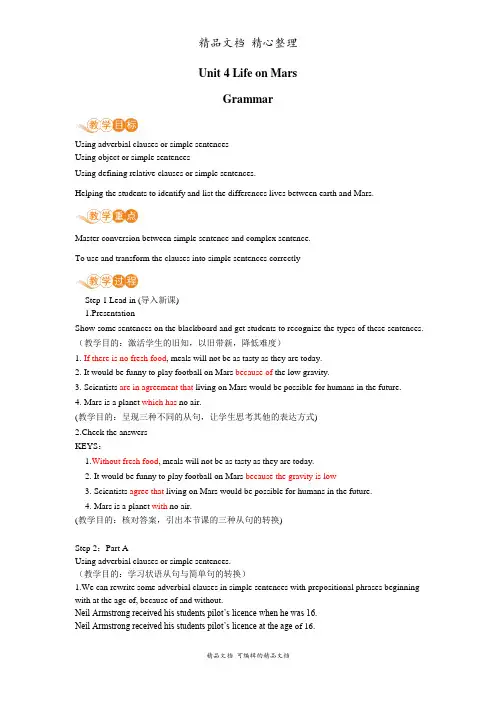
Unit 4 Life on MarsGrammarUsing adverbial clauses or simple sentencesUsing object or simple sentencesUsing defining relative clauses or simple sentences.Helping the students to identify and list the differences lives between earth and Mars.Master conversion between simple sentence and complex sentence.To use and transform the clauses into simple sentences correctlyStep 1 Lead in (导入新课)1.PresentationShow some sentences on the blackboard and get students to recognize the types of these sentences. (教学目的:激活学生的旧知,以旧带新,降低难度)1. If there is no fresh food, meals will not be as tasty as they are today.2. It would be funny to play football on Mars because of the low gravity.3. Scientists are in agreement that living on Mars would be possible for humans in the future.4. Mars is a planet which has no air.(教学目的:呈现三种不同的从句,让学生思考其他的表达方式)2.Check the answersKEYS:--1.Without fresh food, meals will not be as tasty as they are today.--2. It would be funny to play football on Mars because the gravity is low--3. Scientists agree that living on Mars would be possible for humans in the future.--4. Mars is a planet with no air.(教学目的:核对答案,引出本节课的三种从句的转换)Step 2:Part AUsing adverbial clauses or simple sentences.(教学目的:学习状语从句与简单句的转换)1.We can rewrite some adverbial clauses in simple sentences with prepositional phrases beginning with at the age of, because of and without.Neil Armstrong received his students pilot’s licence when he was 16.Neil Armstrong received his students pilot’s licence at the age of 16.People might float in space because the gravity is low.People might float in space because of the low gravity.Humans cannot survive without food, water or oxygen.Humans cannot survive food, water or oxygen.2.PracticeAsk students to do exercise of Part A. Explain the requirement of the exercise.Daniel is writing about visiting about visiting another planet. Help him rewrite the sentences using the words in brackets.Step 3:Part BUsing object clauses or simple sentences(教学目的:学习宾语从句与简单句的转换)1 .We can rewrite some object clauses in simple sentences with prepositions like of and about. The smell of the pills reminds them that food on the Earth is tasty.The smell of the pills reminds them of the tasty food on the Earth.Are they sure about space travel will be very fast?Are they sure about the fast speed of space travel?2. Ask students to do exercise of Part B. Explain the requirement of the exercise.Millie knows little about the planet Mars. She is asking Daniel for more information. RewriteM illie’s sentences using the words in brackets.Step 4:Part CUsing defining relative clauses or simple sentences(教学目的:学习定语从句与简单句的转换)1. We can rewrite some defining relative clauses in simple sentences with prepositionslike with and in.People might live in houses which have huge comfortable rooms.People might live in houses with huge comfortable rooms.On Mars you might see people who wear special boots.On Mars you might see people in special boots.2. PracticeShow ten sentences on the screen. Ask students to change them into the sentences that have relative clauses. Ask them to do the exercises on their own and then check the answers in the whole class .(教学目的:巩固练习,强化本节课所学的知识)Step 5: Extension activityExtension activityLast Wednesday, Mr. Chen took his class to the Space Museum. There 1 many things about space there. First, the children saw a film about space travel. They saw 2 the space shuttle took off in space and later landed on earth 3 . It was very exciting and the children felt they were traveling in space 4 !After the film, Mr. Chen took 5 to see some models of rockets 6 the space shuttle. The models looked very real, but they were much 7 . Then the children saw some moon rocks.Two 8 landed on the moon in 1969. They put an American flag there. Then they took some rocks back to the 9 .10 the children left, they also watched a video show about people living and working in a space lab. The people could stay in the space lab for months.1. A. is B. are C. was D. were2. A. how B. what C. when D. which3. A. too B. already C. again D. badly4. A. itself B. ourselves C. oneself D. themselves5. A. their B. them C. they D. theirs6. A. or B. but C. and D. then7. A. small B. smaller C. big D. bigger8. A. Americans B .Englishmen C .Australians D. Chinese9. A. moon B. star C. earth D. sun10. A. After B. As soon as C. Until D. Before(KEYS:DACDB CBACD)1.完成《课课练》第五课时。
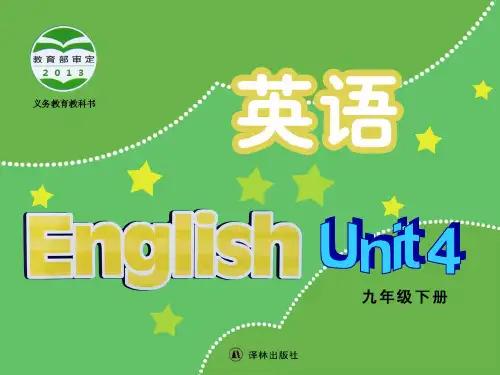
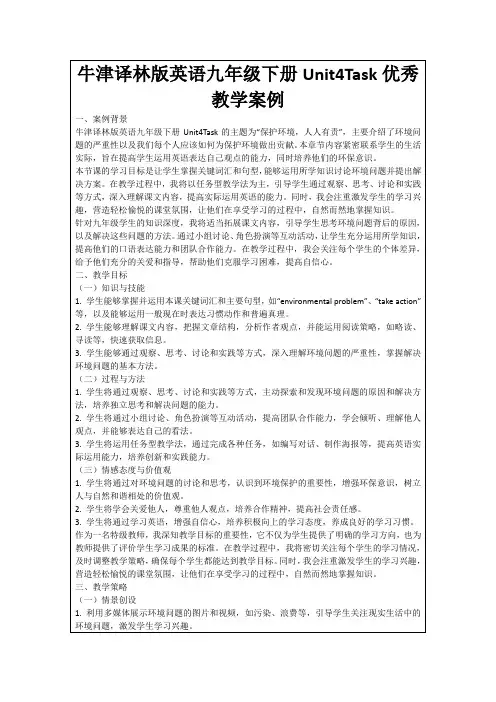
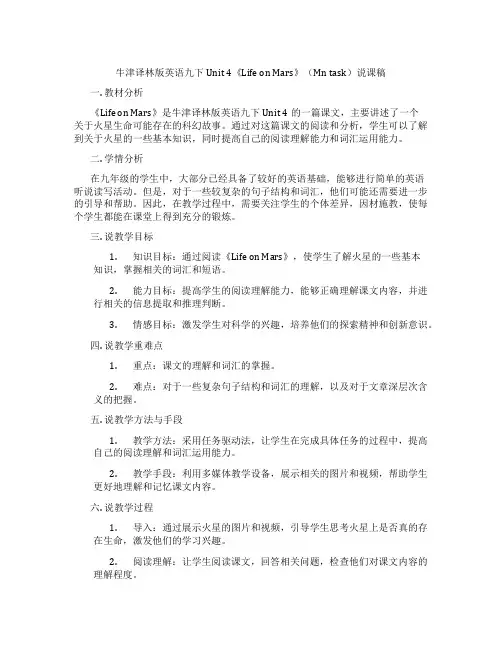
牛津译林版英语九下Unit 4《Life on Mars》(Mn task)说课稿一. 教材分析《Life on Mars》是牛津译林版英语九下Unit 4的一篇课文,主要讲述了一个关于火星生命可能存在的科幻故事。
通过对这篇课文的阅读和分析,学生可以了解到关于火星的一些基本知识,同时提高自己的阅读理解能力和词汇运用能力。
二. 学情分析在九年级的学生中,大部分已经具备了较好的英语基础,能够进行简单的英语听说读写活动。
但是,对于一些较复杂的句子结构和词汇,他们可能还需要进一步的引导和帮助。
因此,在教学过程中,需要关注学生的个体差异,因材施教,使每个学生都能在课堂上得到充分的锻炼。
三. 说教学目标1.知识目标:通过阅读《Life on Mars》,使学生了解火星的一些基本知识,掌握相关的词汇和短语。
2.能力目标:提高学生的阅读理解能力,能够正确理解课文内容,并进行相关的信息提取和推理判断。
3.情感目标:激发学生对科学的兴趣,培养他们的探索精神和创新意识。
四. 说教学重难点1.重点:课文的理解和词汇的掌握。
2.难点:对于一些复杂句子结构和词汇的理解,以及对于文章深层次含义的把握。
五. 说教学方法与手段1.教学方法:采用任务驱动法,让学生在完成具体任务的过程中,提高自己的阅读理解和词汇运用能力。
2.教学手段:利用多媒体教学设备,展示相关的图片和视频,帮助学生更好地理解和记忆课文内容。
六. 说教学过程1.导入:通过展示火星的图片和视频,引导学生思考火星上是否真的存在生命,激发他们的学习兴趣。
2.阅读理解:让学生阅读课文,回答相关问题,检查他们对课文内容的理解程度。
3.词汇学习:引导学生学习和掌握课文中的新词汇和短语,并通过造句等方式进行运用。
4.课堂讨论:学生进行小组讨论,分享他们对课文的理解和感悟。
5.总结:对课文内容进行总结,强调其中的重要观点和知识点。
七. 说板书设计板书设计要简洁明了,能够突出课文的重点和难点。
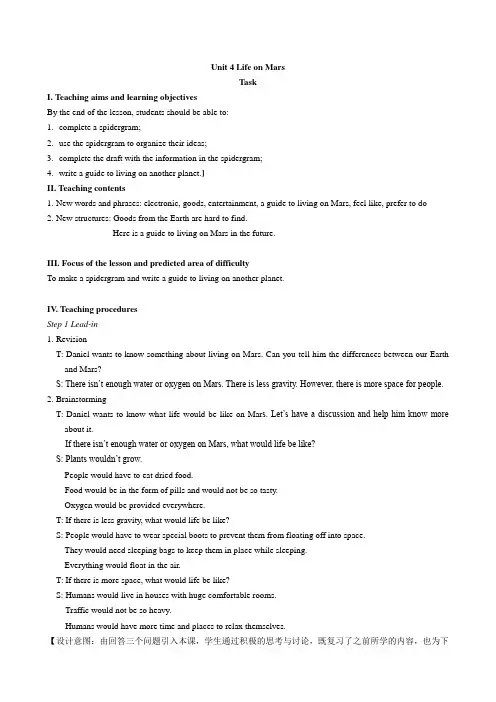
Unit 4 Life on MarsTaskI. Teaching aims and learning objectivesBy the end of the lesson, students should be able to:plete a spidergram;e the spidergram to organize their ideas;plete the draft with the information in the spidergram;4.write a guide to living on another planet.]II. Teaching contents1. New words and phrases: electronic, goods, entertainment, a guide to living on Mars, feel like, prefer to do2. New structures: Goods from the Earth are hard to find.Here is a guide to living on Mars in the future.III. Focus of the lesson and predicted area of difficultyTo make a spidergram and write a guide to living on another planet.IV. Teaching proceduresStep 1 Lead-in1. RevisionT: Daniel wants to know something about living on Mars. Can you tell him the differences between our Earth and Mars?S: There isn’t enough water or oxygen on Mars. There is less gravity. However, there is more space for people.2. BrainstormingT: Daniel wants to know what life would be like on Mar s. Let’s have a discussion and help him know more about it.If there isn’t enough water or oxygen on Mars, what would life be like?S: Plants wouldn’t grow.People would have to eat dried food.Food would be in the form of pills and would not be so tasty.Oxygen would be provided everywhere.T: If there is less gravity, what would life be like?S: People would have to wear special boots to prevent them from floating off into space.They would need sleeping bags to keep them in place while sleeping.Everything would float in the air.T: If there is more space, what would life be like?S: Humans would live in houses with huge comfortable rooms.Traffic would not be so heavy.Humans would have more time and places to relax themselves.【设计意图:由回答三个问题引入本课,学生通过积极的思考与讨论,既复习了之前所学的内容,也为下一个教学过程的进行做好了铺垫。
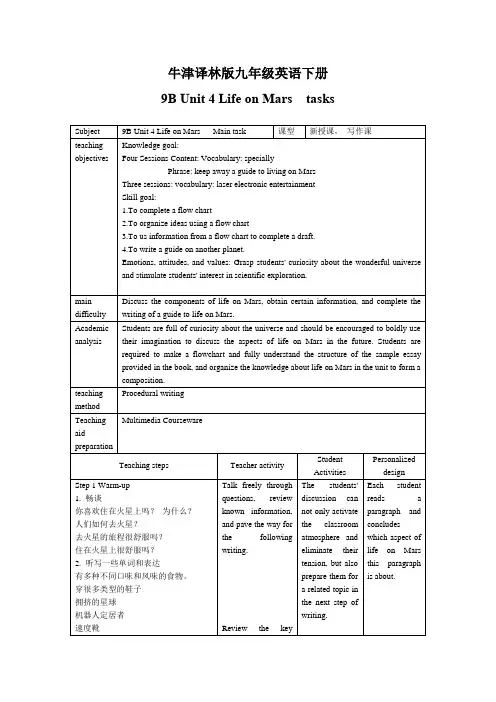
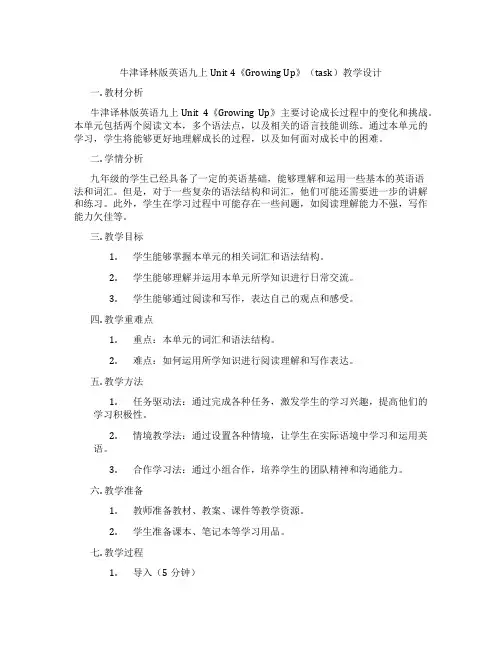
牛津译林版英语九上Unit 4《Growing Up》(task)教学设计一. 教材分析牛津译林版英语九上Unit 4《Growing Up》主要讨论成长过程中的变化和挑战。
本单元包括两个阅读文本,多个语法点,以及相关的语言技能训练。
通过本单元的学习,学生将能够更好地理解成长的过程,以及如何面对成长中的困难。
二. 学情分析九年级的学生已经具备了一定的英语基础,能够理解和运用一些基本的英语语法和词汇。
但是,对于一些复杂的语法结构和词汇,他们可能还需要进一步的讲解和练习。
此外,学生在学习过程中可能存在一些问题,如阅读理解能力不强,写作能力欠佳等。
三. 教学目标1.学生能够掌握本单元的相关词汇和语法结构。
2.学生能够理解并运用本单元所学知识进行日常交流。
3.学生能够通过阅读和写作,表达自己的观点和感受。
四. 教学重难点1.重点:本单元的词汇和语法结构。
2.难点:如何运用所学知识进行阅读理解和写作表达。
五. 教学方法1.任务驱动法:通过完成各种任务,激发学生的学习兴趣,提高他们的学习积极性。
2.情境教学法:通过设置各种情境,让学生在实际语境中学习和运用英语。
3.合作学习法:通过小组合作,培养学生的团队精神和沟通能力。
六. 教学准备1.教师准备教材、教案、课件等教学资源。
2.学生准备课本、笔记本等学习用品。
七. 教学过程1.导入(5分钟)通过提问方式引导学生回顾成长过程中的变化和挑战,激发学生的学习兴趣。
2.呈现(10分钟)教师展示本节课的主要内容,包括词汇和语法结构,让学生初步感知和理解。
3.操练(15分钟)学生分组进行对话练习,运用所学知识进行交流。
教师巡回指导,纠正发音和语法错误。
4.巩固(10分钟)学生完成一些相关的练习题,巩固所学知识。
教师及时批改和反馈,帮助学生纠正错误。
5.拓展(10分钟)学生阅读本单元的阅读文本,理解文本内容,并进行讨论。
教师引导学生表达自己的观点和感受。
6.小结(5分钟)教师对本节课的主要内容进行总结,强调重点和难点。
Unit 4 Task【学习目标】1.能记住并能正确运用本节课词汇goods, electronic, entertainment。
2.能用蛛网图准确地表达自己的想法。
3.能用英语写出关于去另一个星球的指南。
【预习导学】一、词汇记忆1.货物2.电子的3.娱乐4.火星生活指南5.没有空气污染二、头脑风暴。
与同伴交流,写出关于火星的词汇。
______________________________________________________________三、想一想。
你希望火星是什么样子的?你对去火星有什么打算?请你写下来。
________________________________________________________________________________________________________________________________________________________________________________________________________________________________________________________【答案】一、词汇记忆1.goods2.electronic3.entertainment4.a guide to living on Mars5.with no air pollution二、头脑风暴。
与同伴交流,写出关于火星的词汇。
Mars, planet, gravity, helmet, air tank, power pack, crowded, polluted, space, oxygen, alien 三、想一想。
你希望火星是什么样子的?你对去火星有什么打算?请你写下来。
略。
【合作探究】任务驱动一学习绘制蛛网图1.假如你要到某个地方旅游,你希望以下几个方面的情况是怎样的呢?与同伴交流后补充填表。
Unit 4 Growing upTask教学目标After learning this period, the students should be able to:◆ learn to describe a person and his deed or achievements◆ write a report on the people who influence you most.重点难点Some key words, phrases & sentences, e.g:(1)unusual, surprise, research.(2)to one’s surprise,, in one’s fifties, donate blood, medical research(3)You will not find anything unusual about him until you learn more. Whenever he has some money left, he gives someone in need.When I was a little girl, I could not understand why my father always seemed to be kinder to others than to his own family.教学步骤Step1:Presentation & readingIn this unit, we’ve learnt about Spud Webb, Yao Ming and Anne Frank. They’ve influenced us more or less. Today we’re going to write about the person who has influenced us most.Mr Wu is also introducing a similar article, listen to it carefully and answer the following questions.Q1: Who has influenced the author most?2: How old is her father?3: What is her father like?4: What has her father done since 1990?5: What surprised the author?6: What does the author realize now?Ask the students to read the article and encourage them to ask more questions. Step 2:Language points.1. in one's fifties 在某人五十多岁的时候Eg:Helen went abroad for further study in her twenties.海伦二十多岁的时候,就出国深造了。
Unit 4 Life on MarsReading I1. To understand the context of a future life on another planet.2. To recognize and understand vocabulary about life on Mars.3. To recognize and list differences between life on Earth and life on MarsKnow something about living on Mars by reading.Step 1.Lead-in .Say: People have long been dreaming about livin g on Mars. There are a number of films about this topic like The Red Planet and Mission to Mars .Do you believe that humans will ever be able to live on a different planet ?Step2. Presentation1) Now, let’s watch some pictures about life on Earth today .Teach crowded and Polluted.2) Say: Simon and Daniel are talking about living o n Mars. Listen and answer.Step 3 Reading1) Say: Daniel wants to fin d out more about life in space in the future ,here’s the article. Please open your books and turn to page4.. Before we read it, let’s deal with the new words first. Look at here, please find out these new words in the article and guess their meanings.2) Check their answers.Read the new words.3) Listen to the tape and answer the following questions:1. How long does it take to fly to Mars at present?2.What is the gravity on Mars?3.Where will we live on Mars?4.How will we study, do homework and take exams?5 What will food be like on Mars?4) Say: Now please read the article more carefully and try to tell the following sentences T or F. If it is false, please correct the mistake.1. By 2100, people might live on Mars. ( )2 .Mars is becoming crowded and polluted. ( )3. By 2100,the space shuttles can travel at half the speed of sound. ( )4. By 2100, scientists can develop plants on Mars to get food and oxygen ( )5 Humans on Mars have to wear special boots to make themselves lighter. ( )6. We will have less time for our hobbies on Mars.( )7 .Students will go to school by spacecraft. ( )8. Space travel might make people feel ill. ( )5) Check their answers.6) Say: Now listen to the tape and try to find out differences between life on earth and life on Mars. Step 4DiscussionWould you like to live on Mar s? Why or why not?Step 5 Homework-----Read the article again and again练习检测与拓展延伸:A.用括号中所给单词的适当形式填空1.There isn’t any __________(problem) on Mars.2.__________(hope),they believe that they can win the final match.3.It’s __________(high) possible that we’ll move to Mars in the future.4.Daniel is thin king about what life __________ (be) like in the future.5.Yuan Longping is one of the most famous __________(science) in China.6.Mrs Green felt __________(comfortable) because of seven hour’s train trip.B.用所给动词的适当形式填空agree float give teach not go be1.The gravity on Earth can prevent people from _________ away into the sky.2.There __________ little space for people to stand in the future,will they?3.Andy __________ with his sister when we went to visit him this morning.4.Student were made __________ to the public places because of the terrible disease.5.Look!A number of children __________ themselves different skills for physical exercises.。
Unit 4 Life on Mars
Task
I. Teaching aims and learning objectives
By the end of the lesson, students should be able to:
plete a spidergram;
e the spidergram to organize their ideas;
plete the draft with the information in the spidergram;
4.write a guide to living on another planet.]
II. Teaching contents
1. New words and phrases: electronic, goods, entertainment, a guide to living on Mars, feel like, prefer to do
2. New structures: Goods from the Earth are hard to find.
Here is a guide to living on Mars in the future.
III. Focus of the lesson and predicted area of difficulty
To make a spidergram and write a guide to living on another planet.
IV. Teaching procedures
Step 1 Lead-in
1. Revision
T: Daniel wants to know something about living on Mars. Can you tell him the differences between our Earth and Mars?
S: There isn’t enough water or oxygen on Mars. There is less gravity. However, there is more space for people.
2. Brainstorming
T: Daniel wants to know what life would be like on Mars. Let’s have a discussion and help him know more about it.
If there isn’t enough water or oxygen on Mars, what would life be like?
S: Plants wouldn’t grow.
People would have to eat dried food.
Food would be in the form of pills and would not be so tasty.
Oxygen would be provided everywhere.
T: If there is less gravity, what would life be like?
S: People would have to wear special boots to prevent them from floating off into space.
They would need sleeping bags to keep them in place while sleeping.
Everything would float in the air.
T: If there is more space, what would life be like?
S: Humans would live in houses with huge comfortable rooms.
Traffic would not be so heavy.
Humans would have more time and places to relax themselves.
【设计意图:由回答三个问题引入本课,学生通过积极的思考与讨论,既复习了之前所学的内容,也为下一个教学过程的进行做好了铺垫。
】
Step 2 Learn about the spidergram
1. Learn to organize ideas
T: Before visiting a new place, we should get as much information as possible. Most visitors are interested in four keywords most, clothing, food, housing and transport. We have just talked about what life would be like on Mars. Can you separate these ideas into different groups?
T: Look, this is a spidergram. It can help us organize our ideas better.
【设计意图:通过从服装、食物、住房、交通四个方面对要点进行梳理,让学生初步了解蛛网图的结构,为下面完成任务做好准备。
】
2. Practice
Task One: Complete the spidergram in Part A.
T: Now Daniel is making a guide to living on Mars in the future on his own. Let’s give him a hand. Look at the spidergram together. How many groups are there in it? What are they?
S: There are four, money, entertainment, shopping and transport.
T: Work in groups and complete the spidergram together.
Task Two: Make sentences with the information in the spidergram.
T: Can you tell me something about money/entertainment/shopping/transport on Mars?
S: Money on Mars is electronic. It is stored in the Planet Mars Bank. ¥1 is worth around M$10.
…
【设计意图:第一个任务锻炼了学生分类整理信息的能力,第二个造句的任务则帮助学生更好地理解这些信息,为接下去填表的任务扫清障碍。
】
Step 3 Learn about Daniel’s draft
Task Three: Help Daniel complete the draft.
T: Daniel is writing his draft. Help him complete it. Use the information on Page 62 to help you.
T: What is Daniel’s draft about?
S: It’s about a guide to living on Mars in the future.
T: What is each paragraph about?
S: Paragraph One: Beginning[
Paragraph Two: Money
Paragraph Three: Entertainment
Paragraph Four: Shopping
Paragraph Five: Transport
Paragraph Six: End
【设计意图:学习并了解Daniel草稿的写作要点和格式,为完成写作任务做好准备。
】
Step 4 Writing
T: Life on Mars is completely different from life on the Earth. I want to know more about it. Can you tell me about the food, animals, plants, weather and schools on Mars?
First, make a spidergram to organize your ideas. Then, write a guide to living on Mars. You can also draw some pictures if necessary.
【设计意图:通过完成之前的各种学习任务,学生已经一步一步掌握运用蛛网图来组织自己观点并完成写
作的方法。
因此,完成最后的写作任务对于学生来说水到渠成,也是对本课所学的内容的一个升华。
】
V. Homework
1. Review ways to make a spidergram.
2. Look for some information and write a guide to living on another planet.。